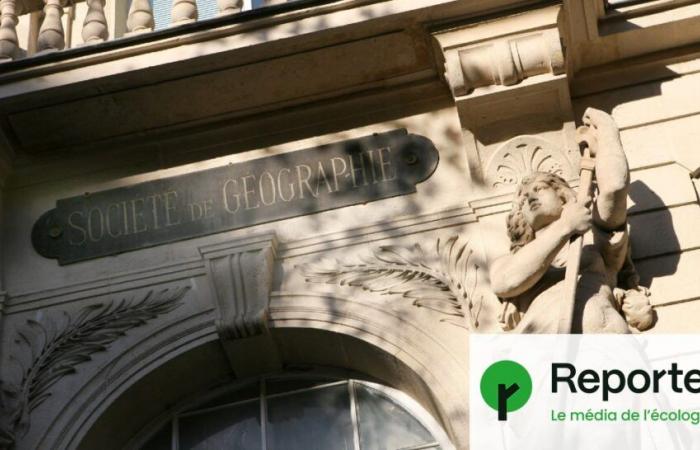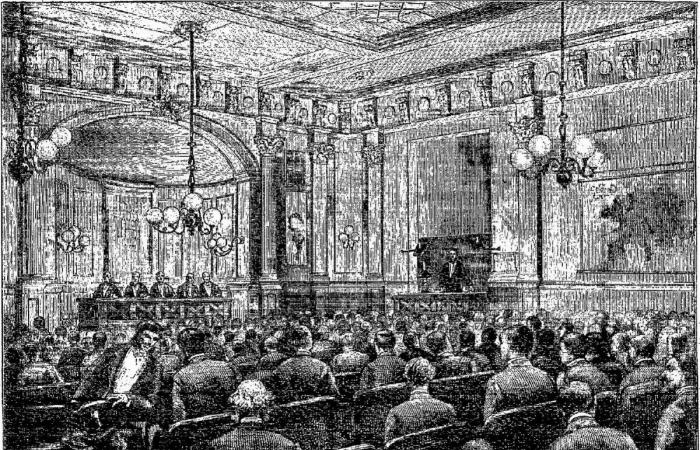It is the oldest geographical society in the world, founded in Paris in 1821. The most illustrious scholarly figures have filled the list of its successive presidents and members, from Pierre-Simon de Laplace to Alexander von Humboldt, including Élisée Reclus. or Jules Verne. Of this glorious past in the service of science, what remains today is an insidious climate-sceptic influence group ?
This is the fear that shakes the Geographical Society today. Two of its members, the geographer Damien Deville and the cosmographer Maxime Blondeau, resoundingly resigned from the institution on November 6, denouncing its « proximity to climate skepticism ». In question, the Company's choice to award its 2024 Grand Prize, on November 30, to Sylvie Brunel, a geographer regularly at the center of controversies on climate change.
The highlighting of such a controversial figure comes in an already tense context. « This is not a mistake, it's a groundswell »deplores Damien Deville. In 2010, the Geographical Society crowned Claude Allègre, historic French emblem of climate skepticism, rewarded specifically for his work The Climate Deceptiona book nevertheless riddled with errors and scientific ignorance.
A climate-reassuring rhetoric
A year earlier, in 2009, the Geographical Society had a new president, Jean-Robert Pitte. This geographer, specialist in landscape, gives a speech which borrows from denialist rhetoric and maintains doubt about the human origin of climate change, in defiance of the scientific consensus on the subject.
While it is proven that current global warming is entirely caused by our greenhouse gas emissions, Jean-Robert Pitte estimated during an interview published in 2020 that « this question deserves better than the certainties asserted all day long in the media, but also by a certain number of narrowly specialized scientists ». He barely conceded that greenhouse gases « play a role » in warming. Before insisting on the « happy consequences » of climate change which is not « not necessarily » a catastrophe.
This graph shows the extent of global warming (gray column), compared to the balance of human influence (first pink column on the left). Science clearly confirms that human activities explain all of the observed warming.
© Sixth IPCC report (2021), first part
This posture « reassuring » — the latest avatar of climate skepticism which no longer denies the reality of warming, but contests the notion of emergency and the warnings launched by climatologists — has become recurrent in conservative circles. The climate emergency calls into question the foundations of our social and economic organization, it is better to minimize the emergency rather than risk delegitimizing the established order.
This approach is also that of Sylvie Brunel. In 2019, she signed a petition claiming « There is no climate emergency » and wrote a column in The World stating that « climate change is not necessarily bad news ». She used classic reassuring arguments: reference to past climatic changes to which humans have been able to adapt, negation of the climatic notion of the risk of irreversibility of ongoing changes, unshakeable faith in the capacity of human genius to surpass the physical limits of the world… « The resource is inexhaustible because it depends on human ingenuity. »
Contacted, the geographer pleads a misunderstanding. « I will no longer sign this petition today. It is certain that the runaway climate is of human origin, the IPCC [1] is categorical. I now try to be more nuanced in my interventions, I am aware that my proactive optimism can be shocking in the face of the multiplication of disasters. But my point is to emphasize the urgency of adaptation: it is our lack of anticipation which aggravates the problem »she said.
No frontal climate denial, therefore. But persistent reassuring rhetoric when asked if there is not a risk that our societies are confronted with « hard limits » to adaptation, if we do not drastically increase our climate efforts, as highlighted in the latest IPCC report. « Today's limits could be pushed back by human ingenuity and the solutions that future generations will find. » And to take Abu Dhabi, capital of the United Arab Emirates, as an emblem of resilience and human genius. « People from countries where there is water come to this desert to raise their children and find an income ! »
Geography, a modernist ideal shaken by the climate
This type of discourse is in reality symptomatic of biases deeply rooted in part of the discipline. « Part of French geography has long retained a climatosceptic prism »tells us a renowned geographer, on condition of anonymity, for fear of fueling interpersonal controversies.
And to add: « Geography was constructed in XIXe century around Darwinism. The idea that the human being was an animal like any other, determined by its environment, has been used by certain geographers to justify racism and colonization. Other geographers have refused this essentialization. The idea that man could adapt, that he was free, that the social mattered more than nature, is crucial in the software of the generation of Jean-Robert Pitte or Sylvie Brunel. The fact that the climate today imposes harsh limits on adaptation is not audible to them; it would mean accepting the failure of modernity. Their great fear, which I share, is that we are renaturalizing the social. »
Engraving from 1885 depicting a public conference organized by the Geographical Society in Paris.
© Gallica / The Picturesque Store
Geography, a discipline which has put humans at the center of the map, is struggling to digest the new narcissistic wound inflicted on humanity and its hubris by the frontal shock that is the Anthropocene.
Some, however, push to turn the page. « Geography should be mobilized to reflect on regional planning issues, crucial in times of ecological emergency. A learned society is supposed to put its researchers to work, to open up fields of knowledge, but the Geographical Society does none of that, it just organizes conferences and trips and harms the reputation of our discipline with this kind of controversy. »sighs Damien Deville.
« Its Anglo-Saxon equivalents are the National Geographic or the Royal Geographical Society, which have become international media offering magazines, films and even a television channel devoted to the complexity and beauty of the world. The French Geographical Society is nothing more than a specter »he denounces in a column co-signed with Maxime Blondeau.
A war of influence in the making
« We are entering a critical momentum for science »they write after the victory of Donald Trump and climate skepticism in the United States. HAS « the dawn of a colonization of imagination » and increasingly violent attacks against science and ecology, the Geographic Society presents itself as « a bastion of climate skepticism in France »they denounce.
Not very active and marginalized, although crowned with its past prestige, does this Society really have any power of influence? ? The fact that she regularly organizes her conferences and lunches in the Senate lounges is not insignificant. « These former researchers put forward by the Geographical Society, who often have not been doing research for a long time, are favored by conservative political circles, unfortunately devoid of scientific culture and contact with active scientists. In the name of their academic authority, they disseminate theses and opinions that are very far from current research. »regrets a geography researcher.
Asked about his positions and those of the Company he chairs, Jean-Robert Pitte did not wish to respond to Reporterre. On the other hand, he benefits from a certain notability: he will chair, for the year 2025, the Academy of Moral and Political Sciences. One of the five prestigious academies of the Institut de France, alongside the Académie des sciences or the Académie française. The first conference organized under his presidency, free and open to the public, will be given by… Sylvie Brunel.
This Academy of Moral and Political Sciences has also just sent a worrying signal regarding its dispositions towards climatology. On November 15, it hosted a conference bringing together the best of French climate skepticism, as reported in an article in New Obs. The Academy dissociated itself from the event, having simply lent a room to the organizers. Among whom we find one of the members of the Academy, Chantal Delsol, a reactionary philosopher at home in circles « climate realists ».
« We are only at the dawn of a war of opinion against science. The Geographical Society is just one example of rampant climate skepticism »alerts Maxime Blondeau. Whatever the upheavals to come against scientific facts, the message from those who resigned is clear: « The Geographical Society is no longer the guardian of the temple. »
legend







